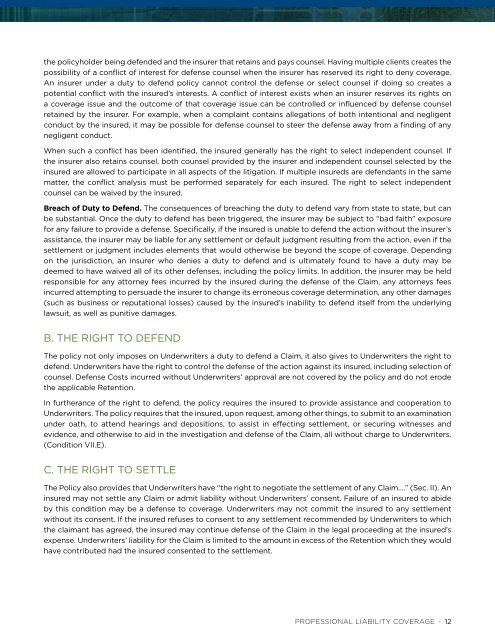You also want an ePaper? Increase the reach of your titles
YUMPU automatically turns print PDFs into web optimized ePapers that Google loves.
the policyholder being defended and the insurer that retains and pays counsel. Having multiple clients creates the<br />
possibility of a conflict of interest for defense counsel when the insurer has reserved its right to deny coverage.<br />
An insurer under a duty to defend policy cannot control the defense or select counsel if doing so creates a<br />
potential conflict with the insured’s interests. A conflict of interest exists when an insurer reserves its rights on<br />
a coverage issue and the outcome of that coverage issue can be controlled or influenced by defense counsel<br />
retained by the insurer. For example, when a complaint contains allegations of both intentional and negligent<br />
conduct by the insured, it may be possible for defense counsel to steer the defense away from a finding of any<br />
negligent conduct.<br />
When such a conflict has been identified, the insured generally has the right to select independent counsel. If<br />
the insurer also retains counsel, both counsel provided by the insurer and independent counsel selected by the<br />
insured are allowed to participate in all aspects of the litigation. If multiple insureds are defendants in the same<br />
matter, the conflict analysis must be performed separately for each insured. The right to select independent<br />
counsel can be waived by the insured.<br />
Breach of Duty to Defend. The consequences of breaching the duty to defend vary from state to state, but can<br />
be substantial. Once the duty to defend has been triggered, the insurer may be subject to “bad faith” exposure<br />
for any failure to provide a defense. Specifically, if the insured is unable to defend the action without the insurer’s<br />
assistance, the insurer may be liable for any settlement or default judgment resulting from the action, even if the<br />
settlement or judgment includes elements that would otherwise be beyond the scope of coverage. Depending<br />
on the jurisdiction, an insurer who denies a duty to defend and is ultimately found to have a duty may be<br />
deemed to have waived all of its other defenses, including the policy limits. In addition, the insurer may be held<br />
responsible for any attorney fees incurred by the insured during the defense of the Claim, any attorneys fees<br />
incurred attempting to persuade the insurer to change its erroneous coverage determination, any other damages<br />
(such as business or reputational losses) caused by the insured’s inability to defend itself from the underlying<br />
lawsuit, as well as punitive damages.<br />
B. THE RIGHT TO DEFEND<br />
The policy not only imposes on Underwriters a duty to defend a Claim, it also gives to Underwriters the right to<br />
defend. Underwriters have the right to control the defense of the action against its insured, including selection of<br />
counsel. Defense Costs incurred without Underwriters’ approval are not covered by the policy and do not erode<br />
the applicable Retention.<br />
In furtherance of the right to defend, the policy requires the insured to provide assistance and cooperation to<br />
Underwriters. The policy requires that the insured, upon request, among other things, to submit to an examination<br />
under oath, to attend hearings and depositions, to assist in effecting settlement, or securing witnesses and<br />
evidence, and otherwise to aid in the investigation and defense of the Claim, all without charge to Underwriters.<br />
(Condition VII.E).<br />
C. THE RIGHT TO SETTLE<br />
The Policy also provides that Underwriters have “the right to negotiate the settlement of any Claim….” (Sec. II). An<br />
insured may not settle any Claim or admit liability without Underwriters’ consent. Failure of an insured to abide<br />
by this condition may be a defense to coverage. Underwriters may not commit the insured to any settlement<br />
without its consent. If the insured refuses to consent to any settlement recommended by Underwriters to which<br />
the claimant has agreed, the insured may continue defense of the Claim in the legal proceeding at the insured’s<br />
expense. Underwriters’ liability for the Claim is limited to the amount in excess of the Retention which they would<br />
have contributed had the insured consented to the settlement.<br />
PROFESSIONAL LIABILITY COVERAGE · 12



